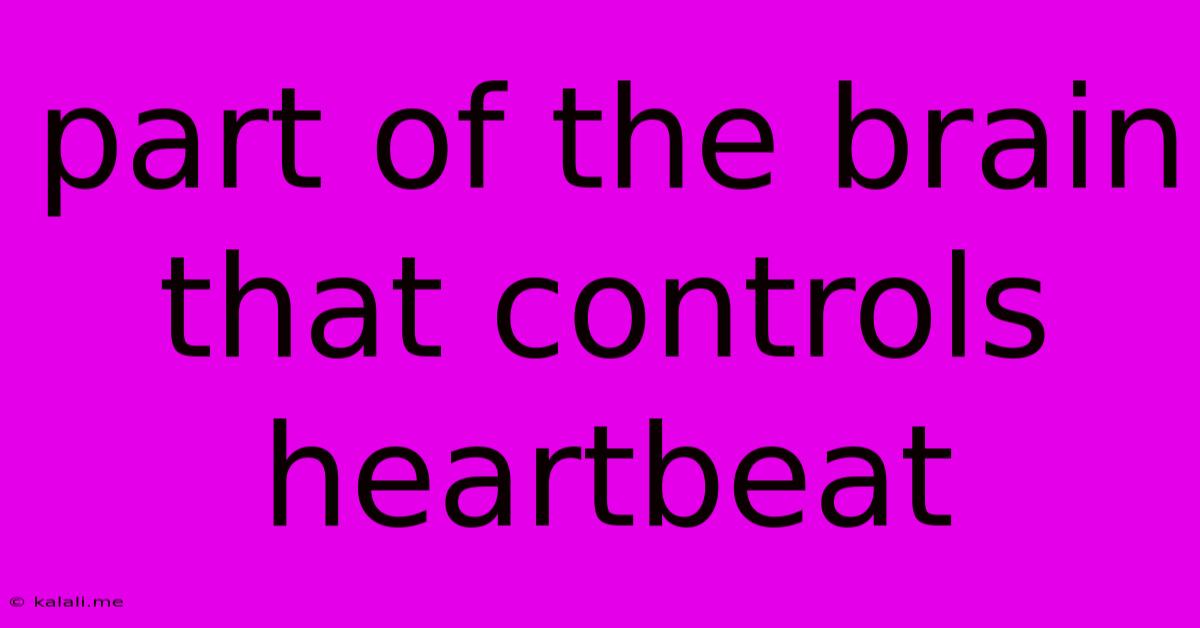Part Of The Brain That Controls Heartbeat
Kalali
Jun 14, 2025 · 3 min read

Table of Contents
The Brain's Control Center for Heartbeat: Unveiling the Medulla Oblongata
Our hearts, tireless engines of life, beat rhythmically without conscious effort. But this seemingly autonomous function is, in fact, meticulously orchestrated by a specific region of our brain: the medulla oblongata. This article delves into the intricate workings of this vital brain area and its crucial role in maintaining our cardiovascular health. Understanding this connection is key to appreciating the complexity of our body's internal systems.
The medulla oblongata, part of the brainstem located at the base of the skull, houses the cardiovascular center, a cluster of neurons responsible for regulating heart rate and blood pressure. This isn't a single, monolithic structure, but a network of interconnected regions working in concert. Within this center, we find two key components:
1. The Cardioacceleratory Center: Speeding Up the Heart
This area increases heart rate and the force of contraction through the sympathetic nervous system. It achieves this by releasing norepinephrine, a neurotransmitter that binds to receptors on the heart muscle (myocardium), causing it to beat faster and stronger. Think of this as the "gas pedal" for your heart. Situations demanding increased energy output, like physical exertion or stress, activate this center. Understanding the role of norepinephrine in this process is vital to understanding the impact of stress on cardiovascular health.
2. The Cardioinhibitory Center: Slowing Down the Heart
In contrast, the cardioinhibitory center acts as the "brake," slowing down heart rate and reducing the force of contraction. This happens via the parasympathetic nervous system, primarily through the release of acetylcholine, another neurotransmitter. Acetylcholine counteracts the effects of norepinephrine, promoting relaxation and slowing the heart's rhythm. This center helps maintain a resting heart rate and prevents the heart from overworking. The balance between these two centers is crucial for maintaining homeostasis, the body's internal equilibrium.
Beyond Heart Rate: Blood Pressure Regulation
The cardiovascular center in the medulla oblongata doesn't just control heart rate; it also plays a pivotal role in regulating blood pressure. This involves interacting with other brain regions and peripheral systems. For example, it influences blood vessel diameter (vasoconstriction and vasodilation) to maintain appropriate blood flow throughout the body. This complex interplay of neural and hormonal signals ensures efficient blood delivery to vital organs.
Factors Influencing Medulla Oblongata Function
Several internal and external factors influence the activity of the cardiovascular center, leading to variations in heart rate and blood pressure. These include:
- Blood oxygen and carbon dioxide levels: Changes in these levels trigger reflexive adjustments in heart rate and breathing.
- Blood pressure: Baroreceptors, specialized pressure sensors in blood vessels, constantly monitor blood pressure and send signals to the medulla to maintain it within a healthy range.
- Hormones: Hormones like adrenaline and cortisol can significantly affect the activity of the cardiovascular center, often leading to increased heart rate and blood pressure during times of stress.
- Temperature: Both elevated and lowered body temperature can impact heart rate.
The medulla oblongata's role in controlling heartbeat is a testament to the remarkable sophistication of our nervous system. Understanding its function provides crucial insight into the complex mechanisms governing cardiovascular health and highlights the critical interplay between the brain and the heart. Further research into this vital brain area continues to reveal new insights into disease processes and potential therapeutic interventions.
Latest Posts
Latest Posts
-
Least Common Multiple Of 4 8 And 12
Jun 15, 2025
-
Difference Between A Square And Rhombus
Jun 15, 2025
-
Unit Weight Of Water In Kg M3
Jun 15, 2025
-
How To Balance Chemical Equations Calculator
Jun 15, 2025
-
Which Of The Following Describes Transpiration
Jun 15, 2025
Related Post
Thank you for visiting our website which covers about Part Of The Brain That Controls Heartbeat . We hope the information provided has been useful to you. Feel free to contact us if you have any questions or need further assistance. See you next time and don't miss to bookmark.